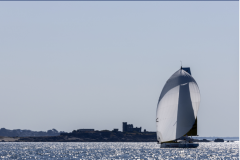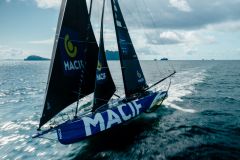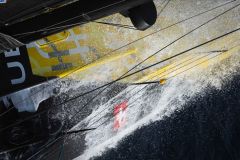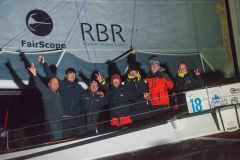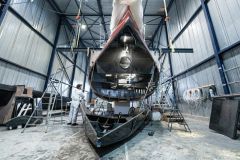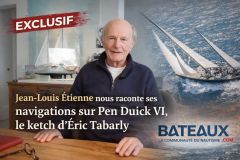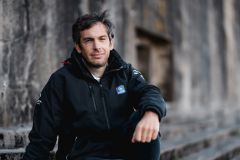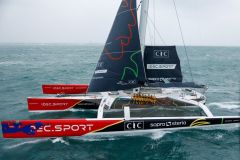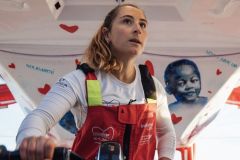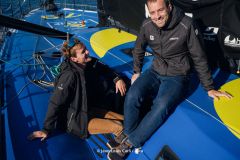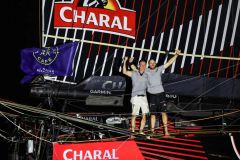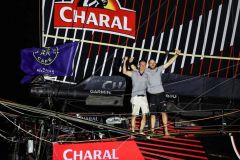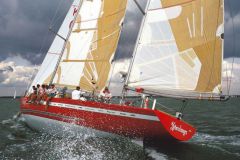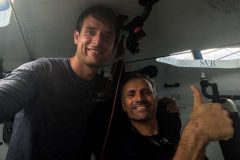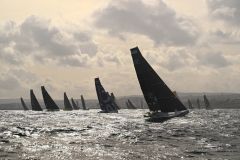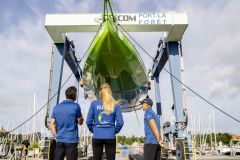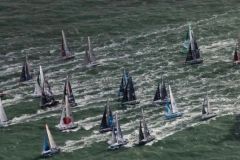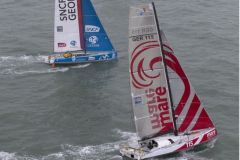It was in 1986 that Lionel Péan won, aboard the Esprit d'Equipe, a boat sponsored by Bull, the mythical Whitbread, a crewed race around the world. The first French winner of the event, the skipper came to give us his vision of this legendary race.
Fell in when he was little
" Very small already " explains Lionel, " i took an interest in this race. I wanted to do it as a sailor or as a skipper, responsible and in charge of my race. I was looking for a partner to finance a boat when Bull issued a call for projects. All the others offered to compete with a maximum. "That's when Lionel Péan made a surprising proposal to his partner:" I answer Bull with a small boat that would be able to perform at any speed in his handicap. "L'Esprit d'Equipe, ex-33 Export, was therefore going to line up at the start line of the race.
Preparation of 4 races for a competition
" We had just won the Fastnet "continues the skipper," i was stressing above all for the first stage of the race, because I clearly felt that it would be at this point in the race that our technical and human choices would be either confirmed or swept aside. The training we had set up for the whole crew lasted 2 years. Two years during which we did not prepare one race, but 4 separate races, one for each stage of the competition. "
A recruitment process with a sharp focus
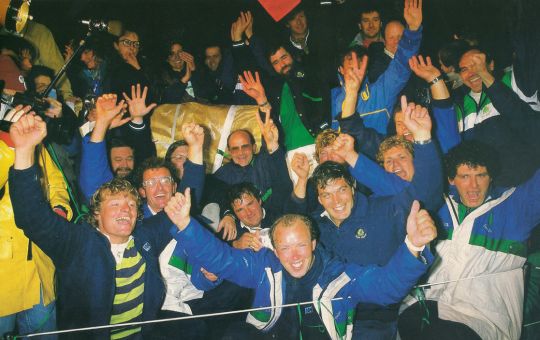
Lionel Péan quickly understood that crew recruitment must be based on factual elements. Elements that must be free of any preconceived notions of camaraderie or cronyism. It can be complicated to get a dozen good men and a boat to work together. The winner explains: " We recruited a lot of people, the principle being that we had to test every crew member. Some stayed for a day, others for years. We were looking for an alchemy that matched the concept of the boat. A true team spirit and conquest had to co-exist. Not just a bunch of friends or a meeting of engineers, but a total complementarity of each one. "Nevertheless, the candidates' basic curriculum was the winner. " I wanted to put together a crew of people who had a real track record of winning if not winning. They had to have practiced Mini, Figaro and ocean racing, as that's the ideal training for a crew. It's in this fish tank that I fished, in Brittany in particular. "
Maximum risk-taking to win
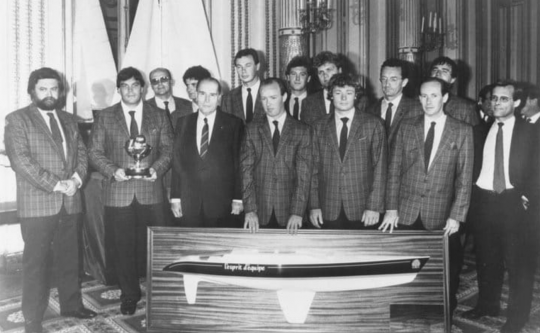
Winning it, always it, transports the crew in the search for extreme optimization. Lionel Péan cites a well-argued example: " Double-blind experiments [Editor's note: one boat in one configuration, another in another, and neither crew knows which configuration it's in] have been realized. Between a boat carrying a 25 kilo wreck and one that doesn't, the lightest one, for an equivalent race, always arrives before the other. Imagine what a ton of water can represent. That's why we only had, on the Esprit d'Equipe, a buffer tank of fresh water of around a hundred litres of water, all the rest was produced as we went along by the desalinator. A thousand litres of water weigh one tonne, you can imagine the impact on the boat's performance! "Always the experience and its validation, to go better and further. Lionel Péan continues: " The aim should always be to reduce the variable mass as much as possible [Editor's Note: Anything added to the boat after it's fully armed and crewed] . We were at 187 kilos of variable mass, all the food dehydrated, the incidentals reduced to a minimum. "Conditions undoubtedly Spartan, but effective.
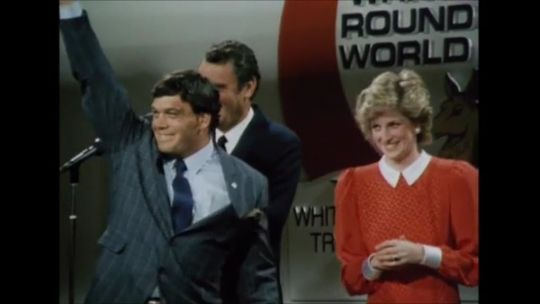
A winning optimization
Performance research has proven to be useful and winning. Team Spirit won 3 of the 4 stages. The lack of success in the second stage, Péan explains: " We left on the Great South Road. The weight was centred much more on the stern and made the boat drag. It took us two days to realise this and re-centre the whole load. It was during those two days that Phillips gained an advantage over us. And it's very complicated, if not impossible, on a race like this to make up for a delay in ignition. "
The Whitbread for a competitor?
Although the Whitbread is a mythical race, it is nonetheless a long and exhausting one. It is exciting to understand what such a competition means to a sailor, in this silent opera that is played out throughout the regatta. Lionel Péan explains: " As the son of a Breton father and a mother whose ancestors were called Mc Cormick, I played rugby in La Rochelle. The Whitbread is the rugby world cup for me. Imagine, it's a race around the world, with a crew and in stages. It's the quintessence of what we're going on the water for. It's about human relationships, sailing, country and competition. It's one of the Holy Grails of life when you can put it on your list of accomplishments. "The Whitbread is also about places, seas and people, which are never the same," explains the skipper It's a long journey with many facets. Going down or up the Atlantic, crossing the Pacific or the Indian Ocean are each time surprising and new experiences, even if you have done it 10 times before in your career. Everything changes, the landscapes, the climates like the sea. And the stages allow you to make some great encounters too, whether within the crew or outside, on land. At that time, there was a long stopover in New Zealand, lasting almost a month. Such a stopover would be unimaginable today in terms of media time, moreover. Well, this month's stopover was a really useful time. Not just for rest or to return to loved ones, but also to actually get in touch with the people and places we crossed. "
The race has evolved and lost a little bit of its soul.
The Whitbread was then limited to professional sailors throughout its history. Lionel Péan deplores this change. " The British wanted to take a turn. Switching to pure professionalism means putting the emphasis on performance and challenge, it's motivating. But it has the major disadvantage of cutting the race off from those who make it live from the inside, those passionate owners who will spend years, in the English style, pampering their sublime boats to take part in the competition. They have written the history of the race and we thank them without thinking about their contribution. It's a loss, but as long as the race was open, including to amateurs, it lined up around thirty competitors. As soon as that changed, we went down to about ten. And the exposure of the race, both to the media and the public, melted away. There's no longer the relay of local clubs of enthusiasts, local businesses or stage officials. We've entered a race of powerful sponsors. It's inevitably an adventure for all that, but it has left a bit of its soul in its wake. "
The next Whitbread open to IMOCA's
The next edition of the race will open up to another class of boat. The IMOCAs, the 60-foot boats taking part in the Vendée Globe, will be taking part in the race. Lionel Péan sees this opening up as a new breath of fresh air for the competition. " There was some very French reticence about this opening. That another famous race was opening up to the IMOCA class meant leaving the Vendée Globe/Jacques Vabre/Route du Rhum triumvirate. But it is a real advantage for the partners and teams to be able to add new events to the catalogue of boats. Not only will a sponsor be able to see his boat more exposed, but as well as locating the race in different parts of the globe, it means opening up sponsorship to companies located elsewhere in the world. In the end, everyone will benefit from this opening. It would be nice that other major races are opening up for the 60-foot class. The more of them there are, the more sponsors will respond. The class as a whole will be a winner! "
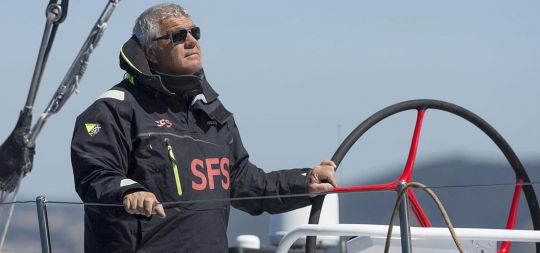
Express CV
Lionel Péan was born in 1956 in Saint-Germain en Laye (Fr.)
Awards :
2017: Sint Maarten WI Record
2016: Winner of Cowes Dinard
2015: Record of the Tour of Corsica
2011: Winner of the Legend Regatta (Volvo Ocean Race) with Team Spirit
2011 : 4th of the Maxi Transatlantic Race Newport Cowes on SOJANA by Peter Harrison
2010 : Winner of the Maxi Transatlantic Race Tenerife St Martin on SOJANA by Peter Harrison
2001 : World Champion of 12 JI on SOVEREIGN
1998 : record of the North Atlantic crossing with a crew on Mari Cha III by R. Miller
1994: 3rd in the Twostar with Pascal Hérold on the catamaran Dupon Duran
1994 : 2nd of Sydney Hobart with KYOTE by Ortwin Kandler
1993: 3rd of Sydney-Hobart on Wild Thing
1990: 5th in the Route du Rhum with the Trimaran Saint-Malo Esprit de Conquête
1986: 3rd in the Route du Rhum with the Catamaran Hitachi
1985: 1st in the Whitbread with the Team Spirit
1983: 1st in the Solitaire du Figaro with Hitachi
1981: 10th in the Twostar with Daniel Gilard on the trimaran Brittany Ferries Fr
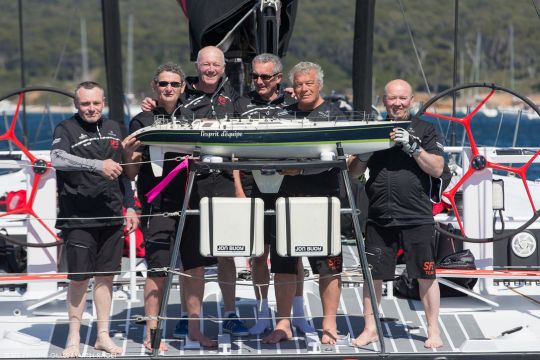

 /
/ 







